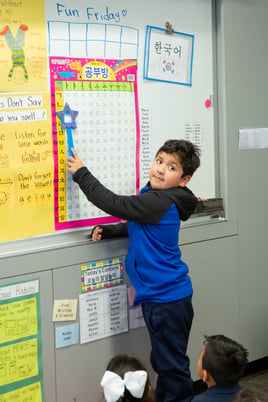Why Even the Best Teachers Need Coaches: Supporting Excellence in Education
As educators, we know that the role of teacher is rapidly becoming more complex and dynamic every year. With so much change, the profession requires continuous growth and development, and even the most accomplished teachers are proven to benefit from having a coach and mentor. In fact, in recent years, teacher coaching has emerged as a significant tool to enhance teaching practices, improve student outcomes, and increase teacher satisfaction and retention.
Coaching teachers provides educators with the unique opportunity to reflect on their instructional practices and gain a deeper understanding of their strengths and areas for improvement. Through regular coaching sessions, teachers can engage in meaningful conversations that encourage self-reflection and self-awareness. The coach is there to ask thought-provoking questions, challenge assumptions, and help teachers explore alternative strategies, leading to enhanced teaching effectiveness. Teacher coaching provides numereous significant benefits to all teachers, including:
Personalized Professional Development
Coaching for educators allows for personalized professional development tailored to the specific needs of each teacher. Unlike traditional, one-size-fits-all professional development workshops, coaching focuses on individual growth and targets specific goals identified by the teacher and the coach together. The collaboration helps to set objectives, design action plans, and allow teachers to employ what they have learned during coaching in their classroom practice while receiving ongoing support and feedback.
This personalized approach empowers teachers to take ownership of their professional growth and ensures that their unique strengths and challenges are addressed effectively. By examining their own teaching practices with the guidance of a coach, even the best teachers can uncover new insights, explore different strategies, and refine their skills.
RELATED: What Instructional Coaching Is and Is Not: Dispelling Common Myths
Individualized Support
Every teacher has unique strengths, challenges, and goals. Coaches recognize these individual differences and tailor their support accordingly. By working closely with a coach, teachers receive personalized coaching, guidance, and strategies that align with their specific needs, level of experience, grade level, or content area. Coaches can assist in areas such as:
- Classroom management and systems
- Differentiation and scaffolding
- Assessment and formative feedback
- Instructional strategies
- Providing feedback and resources to enhance their teaching practice

In our experience coaching thousands of teachers over the last decade, we consistently see how much teachers need and appreciate this individualized support because it provides them with a safe and collaborative space to ask questions, break out of their comfort zone, and enhance their practice.
Proficiency in Instructional Best Practices
Great teachers constantly seek ways to refine their instructional strategies and provide the best possible learning experiences for their students. Coaches play a vital role in this process by observing teachers in action, providing warm and cool feedback, and introducing new-to-them practices. They help teachers feel more comfortable implementing research-based instructional best practices, such as:
-
- Differentiated Instruction
- Small Group Instruction
- Data-Informed Instruction
Research consistently shows that best practices like these enhance student engagement and achievement. With a coach's support, even the most accomplished teachers can further develop their instructional repertoire and adapt their approaches to meet the evolving needs of their students.
RELATED: How to Transform Your Professional Learning with Evidence-Based Coaching
Collaboration & Peer Learning
Coaching promotes a culture of collaboration and peer learning among educators. By working closely with a coach, teachers can engage in meaningful dialogue and share best practices with their colleagues. Coaches help to facilitate collaborative planning sessions, team-teaching experiences, or professional learning communities where teachers can learn from one another, exchange ideas, and collectively solve instructional challenges. This collaborative approach not only benefits individual teachers, but also strengthens the overall instructional capacity of the school or district.
Reflective Practice
Effective coaching encourages teachers to engage in reflective practice, a critical aspect of professional growth. By engaging in meaningful conversations with their coaches, educators can analyze their teaching practices, evaluate the impact on student learning, and identify areas for improvement. Through reflective discussions, coaches help teachers develop a deeper understanding of their pedagogy and challenge them to explore new approaches. This self-reflection fosters a culture of continuous improvement, leading to enhanced student outcomes.
Continuous Growth & Accountability
Coaching establishes a culture of continuous growth and accountability in education. Through ongoing coaching sessions, teachers set goals, track their progress, and reflect on their achievements. In the teacher coaching cycle, coaches provide regular feedback, hold teachers accountable for their commitments, and offer guidance when faced with obstacles. Coaches also encourage teachers to engage in self-assessment and seek opportunities for professional growth beyond the coaching relationship.
Building Emotional Resilience & Well-Being
Teaching can be a demanding and emotionally challenging profession. Even the most dedicated and passionate educators may experience burnout or feelings of self-doubt. Coaches can assist teachers by:
- Providing essential emotional support
- Helping teachers navigate the complexities of their roles
- Offering a safe space for teachers to express their concerns
- Celebrating their successes
- Exploring strategies for self-care
Coaches can also guide teachers in developing effective stress management techniques, maintaining work-life balance, and building resilience – ultimately contributing to their overall well-being and job satisfaction.
RELATED: Instructional Coaches Need These 4 Things
Coaching Supports Experienced Teachers
Coaching is a powerful tool that benefits both teachers and students. All teachers benefit from the guidance and support of a coach to enhance their teaching practices, promote reflection, and refine their skills. Coaching supports experienced teachers who seek to:
- Expand their expertise,
- Take on leadership roles, or
- Transition into new positions within the education field.
Personalized professional development, instructional best practices, collaboration, and emotional support are just some of the many reasons why every teacher – even the best, most experienced ones – needs a coach.
Coaching empowers educators to continuously grow and excel in their profession. It is a catalyst for new teaching strategies and raising teachers into educational leaders. As education evolves, embracing coaching as a standard practice contributes to the ongoing improvement of teaching and learning, increases job satisfaction, and ultimately leads to enhanced student achievement.
"Educators today don't need anyone critiquing their performance. Instead, they deserve to be elevated as talent and to receive the benefit of personalized coaching on competencies through evidence-based conversations that give them agency to meet their individual needs."
Shannon K. Buerk, Founder and CEO of engage2learn




